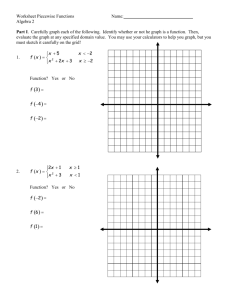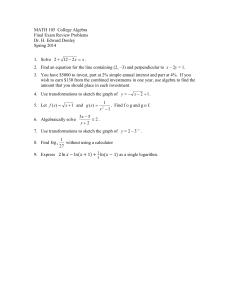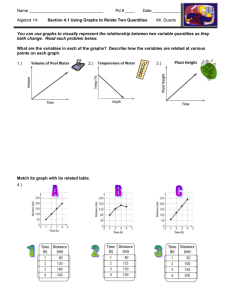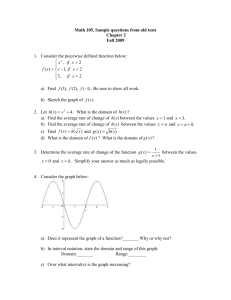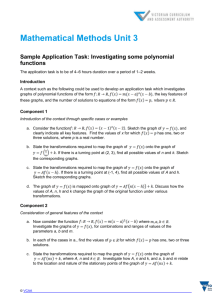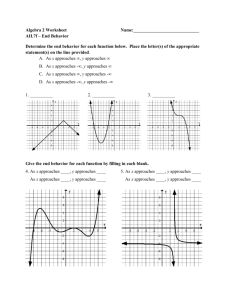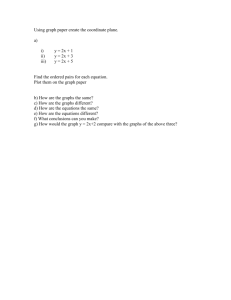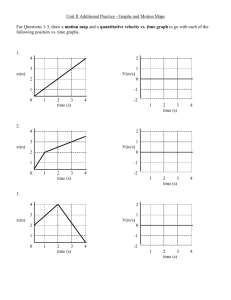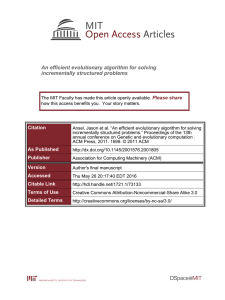Sections 1.5-1.9
advertisement
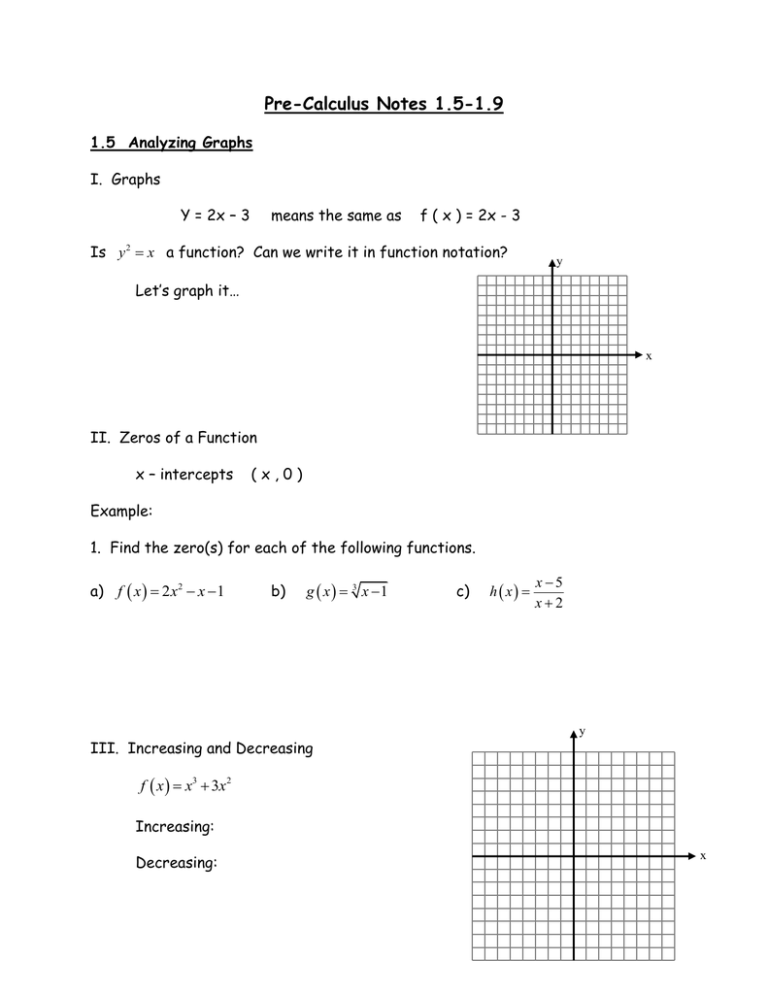
Pre-Calculus Notes 1.5-1.9 1.5 Analyzing Graphs I. Graphs Y = 2x – 3 means the same as f ( x ) = 2x - 3 Is y 2 x a function? Can we write it in function notation? y Let’s graph it… x II. Zeros of a Function x – intercepts (x,0) Example: 1. Find the zero(s) for each of the following functions. a) f x 2 x2 x 1 b) g x 3 x 1 III. Increasing and Decreasing c) h x x 5 x2 y f x x 3 3x 2 Increasing: Decreasing: x 2. Graph f x 3x2 2 x 1 on the graphing calculator and find the maximum, minimum, zeros and the intervals for which the function increases and decreases. y IV. Rate of Change & Average Rate of Change x 3. Find the average rate of change for f x x2 2 x from a) x1 1 to x2 3 b) x1 0 to x2 1 y x 1.6 Parent Graphs I. Linear and Squaring Functions A) Linear f ( x ) = mx + b D : , R : , Increa sin g : m 0 Decrea sin g : m 0 Cons tan t : m 0 ** f ( x ) = c is a constant function m = 0 ** f ( x ) = x is the identity function m = 1 Examples: 1. Write the linear function given that f ( 2 ) = 4 and f ( 5 ) = 1. Now graph. y D: R: x y B) Squaring Function f ( x) x 2 D: x R: Increa sin g : 0, Decea sin g : , 0 Relative Minimum: ( 0 , 0 ) II. Cubic, Square Root and Reciprocal A) y f ( x) x 3 D: R: x y B) f ( x) x D: R: x y 1 C) f ( x ) x D: R: x III. Step Functions and Piecewise Functions y A) Step Function f ( x) x x **show in grapher Examples: 1. For f ( x) x 4 evaluate: a) f ( -2 ) b) f ( 4 ) B) Piecewise Functions c) f ( 2.5 ) d) f ( ½ ) y x 1ifx 2 2. Graph f ( x) 1 xifx 2 x IV. All Parent Graphs 1. 2. f ( x) c f ( x) x y y x 3. x 4. f ( x) x y f ( x) x y x 5. x 6. f ( x) x 2 y f ( x) x 3 y x 7. f ( x) 1 x x 8. y x f ( x) x y x 1.7 Transformations of Functions I. Shifting Graphs f ( x) x 2 f ( x) x 2 2 f ( x) x 2 f ( x) x 2 2 y y y x f ( x) x 2 2 y x x x Examples 1. For the function f ( x) x3 , sketch the following transformations: b) f ( x) x 3 1 a) f ( x) x3 3 3 y y x 2 x II. Reflections a) Reflection in the x-axis means h( x) f ( x) b) Reflections in the y-axis means h( x) f ( x) Example 2. Compare the following graphs with f ( x) x 2 . a) g ( x) x 2 c) p( x) x 2 b) h( x) x 4 III. Non-Rigid Transformations ( Changes the Shape ) Example 3. Compare the following functions with f ( x) x 2 1 b) h( x) x 2 3 a) g ( x) 3x 2 y y x x 4. Compare the following functions with f ( x) x 2 3 1 b) h( x) f x 3 a) g ( x) f (3x) 5. For the function g ( x) 2 x 1 3 , 2 a) Name the Parent Graph f ( x ) b) Describe transformations from f ( x ) to g ( x ) c) Sketch the graph of g ( x ) y x 1.8 Combinations of Functions I. Arithmetic Combinations Examples: 1. Let f ( x) 5 and x 1 g ( x) 1 find: x 1 2 a) f g x b) f g x c) f g x f d) x g II. Composition of Functions f g x f g x Examples: 2. Let f ( x) 3x 4 and g ( x) 2 x 2 3 , find the following: a) f g x c) f g 1 b) g f x d) g f 2 3. Find the Domain of f(g(x)) given: a) f ( x) x and g ( x) x 5 b) f ( x) x 4 and g ( x) 3 x III. Decomposing a Composite Function a) Find f ( x ) and g ( x ) given that f ( g ( x)) 4 x2 . 9 1.9 Inverse Functions I. Definition Let f and g be 2 functions such that f ( g ( x)) x for every x in the domain of g and g ( f ( x)) x for every x in the domain of f. f 1 f x x and f f 1 x x Examples: 1. Find the inverse. a) f ( x) 8 x b) f ( x) 3x 5 2. Verify that f ( x) 5 x 8 and g ( x ) 1 8 x are inverses of one another. 5 5 3. Find the inverse function of f ( x) 2 x 3 and sketch both. y x II. Horizontal Line Test and One-to-One Functions 4. Graph Find f 1 x f ( x) x 2 . Does the graph of f(x) pass the horizontal line test? and graph both. Should we restrict the domain of f 1 x so that we have a function? y x

